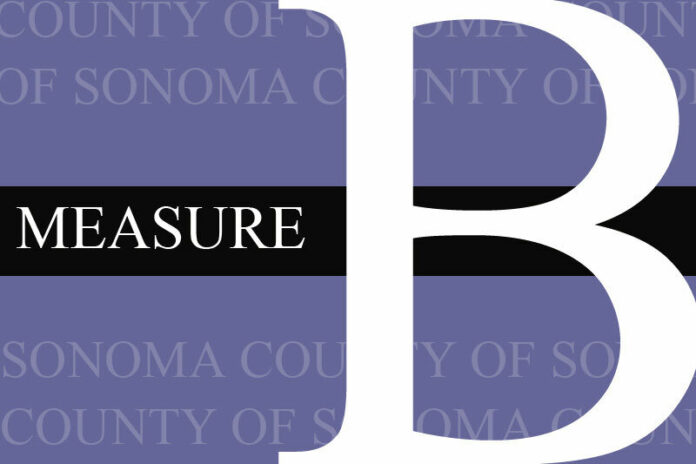Measure B proposes taxing overnight tourists to fund emergency services and schools
If a teacher, a firefighter and a hotel owner walked into a bar in west county, they’d have a lot to talk about concerning Measure B, a proposed 4% rise in the transient occupancy tax (TOT) for the region.
Measure B seeks to charge visitors an additional 4% TOT at inns, hotels, motels, vacation rentals and bed and breakfasts in the combined unincorporated regions of the West Sonoma County Union High School District (WSCUHSD) and the Bodega Bay Fire Protection District (BBFPD), the county counsel’s impartial analysis of the measure said.
If the measure succeeds with two-thirds approval, half of the estimated $2.7 million raised would go to west county paramedic emergency medical and rescue services and consolidating the area’s local fire agencies and half to sustaining west county school facilities and programs, according to the measure’s full text.
Overnight guests would effectively pay a 16% transient occupancy tax in this “West County Transient Occupancy Tax Area” established in the proposal because the 4% would add to an existing 12% general transient occupancy tax on this kind of lodging within all of unincorporated Sonoma County, per the county counsel’s impartial analysis.
Measure B’s full text asserts that tourism has had the impact of visitors straining coastal emergency and rescue service capacity and that second homes bought to convert to vacation rentals priced families out of the region and thus sank local student enrollment.
Meanwhile, members of the west county hospitality industry have organized to fight the proposed levy as they cope with the economic earthquake of the pandemic. The special tax would begin July 1 if passed, the measure’s full text said.
Sonoma West Times & News reported on arguments for and against the lodging tax in December and can be read here.
Hearing from “Tax Tourists Fairly” campaign in favor of Measure B
The “Tax Tourists Fairly” campaign consultant advocating for Measure B’s passage is Dennis Rosatti, principal of the Rosatti Consulting public affairs and campaign firm and husband to WSCUHSD Board President Kellie Noe.
“The money is programmed, number one, to return to source. So, all the money generated from this revenue will come back into the west county. It does not get lost in the county general fund,” he said.
He said the overnight lodging tax is “a creative attempt” to address regional consequences of the tourism industry, namely driving up the cost of living, driving families out of attendance areas and driving most of the coastal emergency service transports.
“We actually live in a fairly high-end, luxury vacation market,” he said, adding people who wanted to stay in a motel would find one in Santa Rosa, not on the coast.
“And it’s not that much money, when you think about it,” he said. “I don’t think that folks are coming here to spend hundreds of dollars on cases of wine and thousands of dollars on their vacation are going to really notice that, and they’re getting such a great benefit back.”
As housing stock lowers, families get priced out and enrollment drops and sinks school funding by average daily attendance, he said.
While opponents to Measure B in the hotel industry have said a 16% transient occupancy tax would complicate a comeback after the pandemic hit hospitality hard, Rosatti said he hadn’t seen any data indicating Measure B would cost jobs.
“A fair and modest tax on tourists will save the jobs that save lives,” he said. “This measure will serve the visitor equally if not more so than the local because 80% of the transports coming out of Bodega Bay and their ambulance are for non-resident taxpayers,” Rosatti said.
“So, to me, I would think that those visitors would want a high level of service to come when they are in trouble or need emergency health support,” he added.
Half of Measure B’s revenue, an expected $1.35 million, would go toward funding the Bodega Bay Fire Protection District’s consolidation with the broader Sonoma County Fire District (SCFD), an annexation already approved by the Sonoma County Local Agency Formation Commission (LAFCO), Rosatti said.
Meanwhile, the county counsel’s impartial analysis said the Sonoma County Board of Supervisors would create an Education Advisory Committee to recommend how to direct the half of Measure B’s revenue for west county schools.
According to Rosatti, Measure B positions to fund WSCUHSD for two or three years so it can maintain its three schools while waiting for the results of an 18-month study on district unification that the Sonoma County Office of Education (SCOE) is now hiring an outside expert to conduct.
Depending on what the 11 west county school districts decide, the funding could go toward unifying elementary and middle school districts once the results come out, should they choose, he said. Further, he said the study could conclude consolidating into one west county high school is the most practical or go as far as suggest two separate regional districts.
“It could come back and say something totally different. It will be interesting to see what the results of that data are,” he said. “After unification plays out,” he said the funds could go to childcare, pre-school education and adult learner and senior education.
“They could be spent on facilities if a school came forward and said, hey, we’ve got a funding gap and we really need to redo our portable units or our roofs or our library needs an update,” he added.
Hearing from the “Save Sonoma Jobs” campaign against Measure B
Guerneville restaurateur and hotelier Crista Luedtke chairs the “Save Sonoma Jobs” campaign against Measure B alongside Joe Bartolomei, the co-owner of Farmhouse Inn located in Forestville.
“This has certainly not been an easy year for hospitality and then put the icing on the cake with Measure B and having to sort of fight hard to ensure that we can continue to bring our people back and not have anything stand in the way of recovery,” Luedtke said.
Luedtke owns boon eat + drink, the restaurant, and boon hotel + spa for boutique lodging, in addition to craft cocktail bar El Barrio and BROT, a modern German eatery.
El Barrio just partially reopened and she hopes to get BROT going again in April, Luedtke said. The proprietor said she started working as a licensed mortgage broker again to pay the bills and bring back staff.
“To be perfectly frank, I’m very confident that we’re going to win this thing. And I believe part of what’s helping the campaign is just the lack of transparency that has happened on the other side and just the rushed timeline,” Luedtke said.
In the formal ballot measure rebuttal, Sonoma County Taxpayers Association Executive Director Dan Drummond criticizes Measure B for a “rushed last minute change” to add in west county school district as recipients of half of the tax funds, should it be approved.
“As originally drafted, Measure B, a tax on overnight lodging, would have raised money to help beleaguered west county fire and paramedic services. Since visitors account for a disproportionate amount of emergency service calls, it makes sense that they should help pay for those services,” Drummond’s statement reads.
“In its current form, Measure B diverts half of its proceeds away from fire and paramedic services while funneling them instead to the high school district. The declining enrollment problem doesn’t go away and the consolidation decision is kicked down the road a couple years. Meanwhile, millions of tax dollars will be wasted propping up the struggling school district,” it continues.
According to Luedtke, the pro-TOT campaign’s slogan, “Tax Tourists Fairly,” isn’t accurate because the proposed levy misses day trippers she said litter and park all over.
The restaurant and hotel owner said the proposal flew to the ballot without consulting with the lodging proprietors “strapped with this,” adding the entrepreneurs could have pitched in ideas.
Luedtke said her rates run “anywhere from I think $215 mid-week up to $375 on a weekend.”
She took issue with the idea that the west county lodgings were luxury and that their guests wouldn’t mind the added fee.
“But what if I wanted to raise my rates 5% or 6%? Because right now, my costs of doing business are so much greater due to the pandemic. There’s hazard pay, there’s cost of PPE, there’s more rigid cleaning protocols,” she said. “So, my actual costs have gone up for my product and now I’m going to potentially not be able to raise my rates because I’m going to start to price people out of the game if I’ve got to slap on another 4%.”
She said she’s been contacted by teachers and people working in local fire agencies saying more people opposed Measure B than would admit it for fear of judgement. Luedtke said the county needed to hold itself accountable to its budget and the district its long-term issues.
“Difficult decisions have to be made. I know I’m not going to be popular for saying that, but at some point, it’s what you have to do to stay in business,” she said.
Editor’s Note: This article was edited to reflect updated information on the district unification study. WSCUHSD had requested SCOE conduct the district unification study and since then, SCOE is hiring “an outside expert and will work with them to actually conduct the study,” according to Jamie Hansen, SCOE Director of Communications on Feb. 26.









